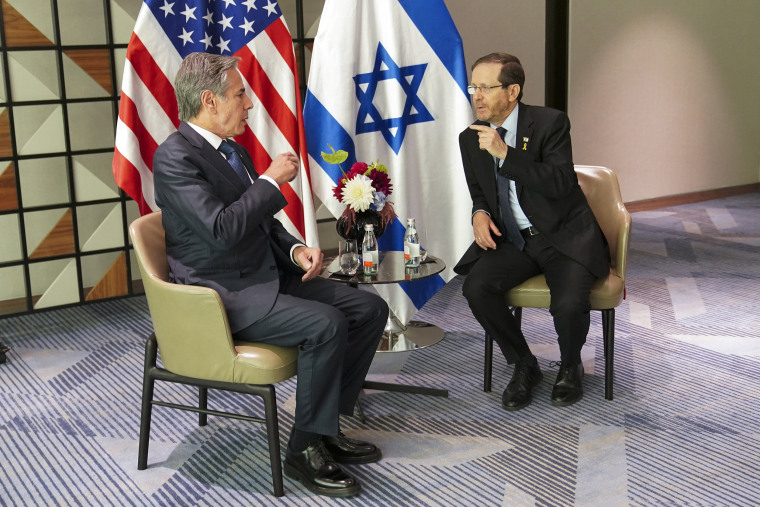Blinken can claim one win after Mideast trip, but also plenty of losses
Secretary of State Antony Blinken arrived back in the United States just as Israel was striking Iran — its anticipated retaliation for a massive missile strike earlier this month.
There was obvious relief among State Department officials as they heard the initial reports: Israeli Prime Minister Benjamin Netanyahu had bent to Blinken’s urging to strike military targets, not nuclear sites or energy fields. Washington had pressed its ally in the hopes of ending the cycle of attacks and avoiding escalation into a wider war.
But this one albeit significant victory came as time was running out for America’s top diplomat to achieve the cease-fire in the Gaza Strip and hostage release that have eluded him for 13 months.
While a proposal for an initial two-day truce and the release of four hostages in exchange for some Palestinian prisoners, outlined publicly by Egypt, is now on the table, an agreement and thus an end to the devastating war in Gaza and Israel’s more recent incursion into Lebanon show no signs of letting up.
Nonstop travel
It has been a year of almost nonstop travel for Blinken involving 11 trips to the Middle East since the Oct. 7 Hamas terror attack on Israel that left 1,200 dead and 250 taken hostage.
During his latest visit, Israel was once again attacking the Jabalia refugee camp in northern Gaza, resulting in increased Palestinian casualties and suffering, and ignoring U.S. calls to seize the opportunity to end the war now that Israel had killed Hamas leader Yahya Sinwar.
More than 42,000 Palestinians have died in the war, according to local officials, with Israeli strikes driving the vast majority of the blockaded enclave’s population from their homes, destroying a large portion of its buildings and services.

And despite months of the U.S. demanding that Israel allow more humanitarian aid into Gaza, only a trickle of food, water and fuel was being delivered to the people who desperately need them.
Even more ominously, U.S. officials had heard that Israeli hard-liners were promoting a plan to either starve, kill or force out Palestinians in northern Gaza so that Jewish settlers could reoccupy the area, something the United States has argued against.
In Lebanon, Israel was also defying the U.S. by expanding its bombing of Beirut and its suburbs, only hours after the departure of U.S. mediator Amos Hochstein. The U.S. has been pressing Israel to limit its targets to Hezbollah strongholds and weapons stockpiles in southern Lebanon.
All this came as former President Donald Trump confirmed that he expressed support for Israel’s offensives against Hamas and Hezbollah in recent calls with Netanyahu — leading U.S. officials to believe the Israeli leader may well be holding out for his chances if Trump wins the election next week.
Leaving Israel for Saudi Arabia after talks with Netanyahu, Blinken said the Israeli leader had assured him that the plan for settlers to reoccupy northern Gaza was not his government’s policy. Blinken said during their meetings that he was focused on getting more humanitarian aid into northern Gaza and that the U.S. has seen some progress, but not enough.
Two weeks ago, the U.S. gave Israel 30 days to get humanitarian aid to those who need assistance or else risk losing the supply of U.S. offensive weapons under a long-standing U.S. law. Blinken said that the U.S. is tracking the aid deliveries very carefully and that it’s “absolutely essential” that Israel comply.
Victory for Blinken
One clear result of U.S. diplomacy was Israel’s decision — for now — to try to avoid further escalation with Iran by limiting its airstrikes. But on the fighting in Gaza and Lebanon, there was no sign of any accord with the U.S. advice to “take the win” and declare the war over.
“Israel has achieved most of its strategic objectives when it comes to Gaza,” Blinken said in Tel Aviv.
“It’s managed to dismantle Hamas’ military capacity. It’s destroyed much of its arsenal. It’s eliminated its senior leadership, including, most recently, Yahya Sinwar,” he added. “This has come at the cost — the great cost — of Palestinian civilians in Gaza. Now is the time to turn those successes in an enduring strategic success, and there are really two things left to do: get the hostages home and bring the war to an end with an understanding of what will follow.“

But during an emotionally fraught meeting with families of American hostages in Israel, according to several of those present, Blinken could offer little evidence of progress on a cease-fire deal other than the death of Sinwar, long considered the chief obstacle to an agreement.
Still, officials in Qatar and Egypt began engaging last week with Hamas representatives in Doha. To further test the viability of renewing negotiations, CIA Director William Burns joined his Israeli, Qatari and Egyptian counterparts in Doha. It was not a promising beginning: Israeli officials reported that their offer days earlier of safe passage out of Gaza to Hamas members who would lay down their arms was flatly turned down by Hamas negotiator Khalil al-Hayya.
With hopes diminishing that Sinwar’s death would produce a diplomatic breakthrough, a senior U.S. administration official said that while in the region, Blinken was also holding detailed discussions on security and governance structures for Gaza once the war ends.
For months, Blinken has said he wants to have plans ready for what he calls “the day after” the war in case a cease-fire can be negotiated. Senior officials say the plans are now far along for Arab countries to help rebuild Gaza and, if Israel would withdraw its troops, create an Arab-led security force.
U.S. diplomats are also talking to the Palestinian Authority, widely criticized for alleged ineffectiveness and corruption, about bringing in reformers to replace its aging leadership so it can credibly govern a post-war Gaza. Blinken discussed these proposals in his meetings in Riyadh with Saudi Crown Prince Mohammed bin Salman, who is also trying to revive a proposal for the Saudis to recognize Israel and create new bonds between Israel and the wider Arab world — if Israel would grant the Palestinians at least a pathway toward peace and future independence.
The administration should have considerable leverage over Israel, which gets more than $3 billion in U.S. military aid annually. After Oct. 7, this was dramatically increased, with Congress agreeing in April to send a further $14 billion to Israel in military assistance. (It also signed off on $9.5 billion in humanitarian aid for Gaza, as well as the conflict zones of Ukraine and Sudan.)
The attraction of a Saudi deal for Netanyahu, who has long opposed a Palestinian state, would be the prospect of access to enormous economic benefits. As part of the deal, Saudi Arabia was also negotiating a separate security agreement with the U.S. That plan, which President Joe Biden had embraced a year ago, came to a full stop when Hamas attacked Israel on Oct. 7.
But far-fetched as it might seem, it came up during Blinken’s meeting with the Saudi crown prince during this trip.
The war has only hardened Netanyahu’s opposition to Palestinian statehood, and widespread anguish and anger over Israel’s destruction of Gaza have made it much more difficult politically for Arab leaders to consider making peace with Israel.
In a final sign of how far the Gaza war has set back relationships between Arab leaders and Israel, Jordanian Foreign Secretary Ayman Safadi offered Blinken a tough assessment when they met in London on his way home.
“The guns have to go silent, diplomacy has to take precedence, and we’ve got to save the whole region from the abyss of what’s going on,” the Jordanian diplomat said while sitting across from his U.S. counterpart. ”It’s getting worse, unfortunately, every time we meet, not for lack of us trying, but because we do have an Israeli government that is not listening to anybody, and that has got to stop.”
Blinken returned home not knowing how many days he will have left to try to silence those guns, and, if possible, create a new framework for peace in Gaza or Lebanon.




